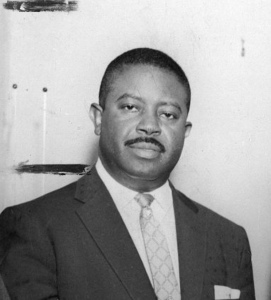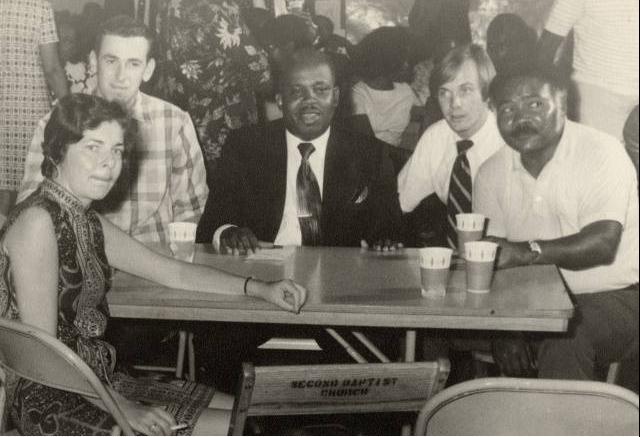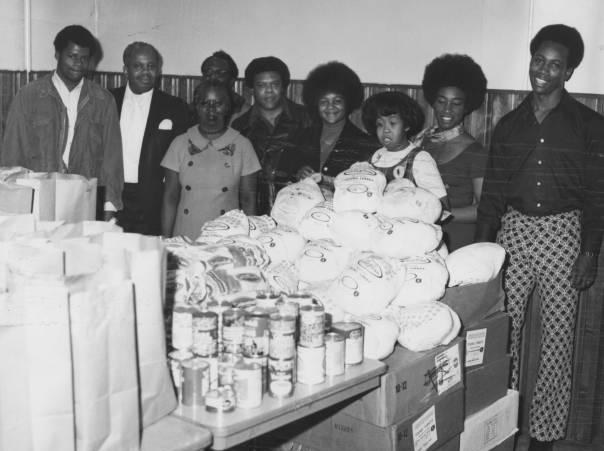
Photo info ...
(Nov. 20, 1921-Aug. 2, 1996). Born in Duncan, Mississippi, Andrew J. Brown attended the historically Black Bishop College in Marshall, Texas, where he graduated with a degree in Baptist ministry. Brown served in World War II in both the Pacific and European theatres. His commitment to social justice crystallized during the war while hospitalized at Camp Livingston, Louisiana, on Christmas Eve. Facing a possible amputation of his leg and listening to a celebration to which African American soldiers were excluded, Brown vowed to fight for justice for all people if his leg was saved. Brown kept his word upon release from the hospital, leg intact. In 1947, he and his wife moved from Chicago to Indianapolis where he began his longstanding leadership as pastor of , which lasted from 1947 to 1990.

Under Brown’s guidance, the St. John’s congregation became one of the largest and most progressive African American churches in the nation. He used his pulpit to protest racial discrimination and social injustice in Indianapolis. During the 1950s and 1960s, Brown belonged to the group of young ministers that included and Arthur Johnson who committed themselves to fight for the civil rights of their congregants and the African American community at large in what was still a segregated city.
In Indianapolis, Brown started Operation Breadbasket, and cofounded . On the national front, he served alongside civil rights leaders Dr. Martin Luther King Jr. and Rev. Ralph Abernathy to push for the civil rights of all African Americans. He fought for an end to the dead-end jobs, tightly packed segregated neighborhoods, and openly racist and segregated schools to which African American workers, families, and students were subject.
In 1963, Brown championed African Americans’ voting rights. He organized a voter registration drive to demonstrate voting Black strength during the 1963 local election, which resulted in the selection of two African Americans to the Indianapolis City Council. In 1969, he organized a march on the Indiana governor’s residence to protest state policies he felt were unfair to the poor.
Brown also led his community to confront civil rights abuses on a national level. In August 1963, he took numerous congregants to Washington, D.C., to participate in the March on Washington for Jobs and Freedom. In March 1965, he joined civil rights leaders as he marched at Selma, Alabama, with Dr. Martin Luther King Jr. and was at the home of King’s parents the night the civil rights leader was assassinated in April 1968. The next month he urged the African American community of Indianapolis to join him as he traveled to Washington, D.C., for the Poor People’s March.

As his reputation as a powerful speaker increased, Brown used the pulpit to inspire action and attract national civil rights leaders to Indianapolis. Brown formed his own organization to fight for civil rights after his term as president of the Indianapolis chapter of the ended. The Indianapolis Social Action Council was born at a St. Johns’s service for slain NAACP president Medgar Evers. Subsequently Brown gained the attention of Baptist churches across the South where he received invitations to deliver sermons.
Civil rights issues were not Brown’s sole passion. He championed the creation of enduring cultural institutions that served African Americans in Indianapolis and throughout the state. Brown joined fellow community leaders and to create Indiana Black Expo in 1970. The one-day event at the , which promoted the social and economic progress of African Americans, has since grown to a 10-day spectacle that takes place at numerous Indianapolis venues and is one of the most popular African American events in the nation.
He also originated and hosted Operation Breadbasket a Saturday morning radio program on AM 1310. The morning radio program served as another pulpit from where Brown spoke about civil rights issues, provided economic advice, and offered spiritual messages. Brown used his radio program as a force for positive good in the African American community.
Brown left an enduring legacy in Indianapolis, from breaching racial barriers and fighting racism to building important cultural and religious institutions. Indiana congressman referred to Brown as Mr. Civil Rights in Indiana. In 1986, Indianapolis renamed Martindale Avenue, which was the location of St. John’s Missionary Baptist Church, Dr. Andrew J. Brown Avenue in his honor. In 2003, a local group, which included Indiana Black Expo and Rev. Brown’s son, Dr. Thomas L. Brown, organized and opened a charter school bearing Rev. Andrew Brown’s name, Andrew J. Brown Academy.
FURTHER READING
- “Proclamation Honoring Andrew J. Brown,” Congressional Record 142, no. 125, Sep. 12, 1996, https://www.govinfo.gov/content/pkg/CREC-1996-09-12/html/CREC-1996-09-12-pt1-PgE1608.htm.
- “Reverend Dr. Andrew J. Brown, Jr.,
St. John’s Missionary Baptist Church,” Digital Civil Rights Museum, https://www.digitalresearch.bsu.edu/digitalcivilrightsmuseum/items/show/39.
CITE THIS ENTRY
APA:
Verderame, J. A. (2021). Andrew J. Brown. Encyclopedia of Indianapolis. Retrieved Jan 24, 2026, from https://indyencyclopedia.org/andrew-j-brown/.
MLA:
Verderame, Jyoti A. “Andrew J. Brown.” Encyclopedia of Indianapolis, 2021, https://indyencyclopedia.org/andrew-j-brown/. Accessed 24 Jan 2026.
Chicago:
Verderame, Jyoti A. “Andrew J. Brown.” Encyclopedia of Indianapolis, 2021. Accessed Jan 24, 2026. https://indyencyclopedia.org/andrew-j-brown/.

Help improve this entry
Contribute information, offer corrections, suggest images.
You can also recommend new entries related to this topic.